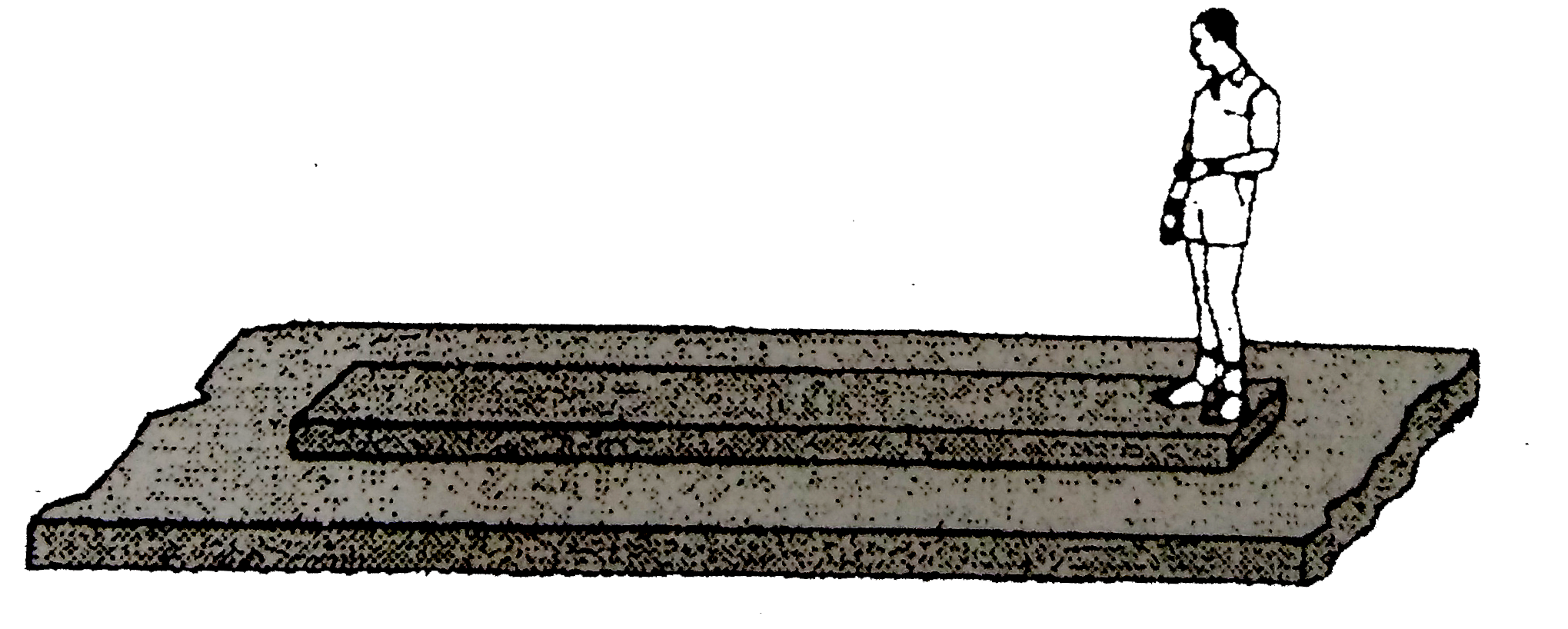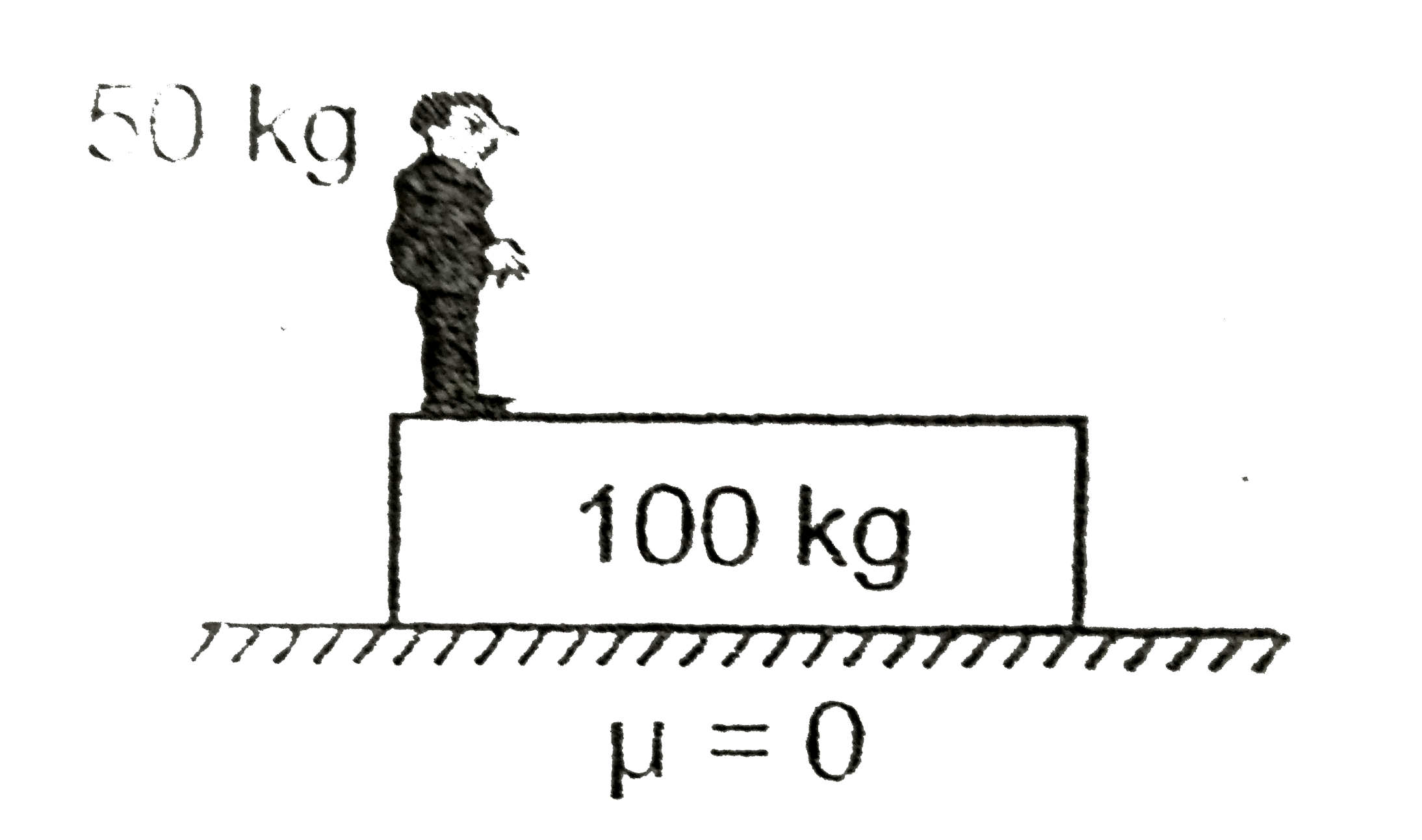A man stands at one end of the open truck which can run on frictionless horizontal rails. Initially, the man and the truck are at rest. Man now walks to the other end and stops. Then which of the following is true?
The truck moves opposite to direction of motion of man even after the man ceases to walk.
The center of mass of the man and truck remains at the same point throughout the man's walk.
The kinetic energy of man and truck are exactly equal throughout the man's walk.
The truck does not move at all during the man's walk.
The correct Answer is:B
Step by step video, text & image solution for A man stands at one end of the open truck which can run on frictionless horizontal rails. Initially, the man and the truck are at rest. Man now walks to the other end and stops. Then which of the following is true? by Physics experts to help you in doubts & scoring excellent marks in Class 12 exams.
Topper's Solved these Questions
- BOOK - RESNICK AND HALLIDAYCHAPTER - CENTER OF MASS EXERCISE - Practice Questions (More than One Correct Choice)5videos
CENTER OF MASS
- BOOK - RESNICK AND HALLIDAYCHAPTER - CENTER OF MASS EXERCISE - Practice Questions (Linked Comprehension)6videos
CENTER OF MASS
- BOOK - RESNICK AND HALLIDAYCHAPTER - CENTER OF MASS EXERCISE - Problems46videos
CENTER OF MASS
- BOOK - RESNICK AND HALLIDAYCHAPTER - CAPACITANCEEXERCISE - PRACTICE QUESTION (INTEGER TYPE)3videos
CAPACITANCE
- BOOK - RESNICK AND HALLIDAYCHAPTER - CIRCUITSEXERCISE - Practice Questions (Integer Type)3videos
CIRCUITS
Similar Questions
No external force: Stationery mass relative to an inertial frame remains at rest
A man of mass m is standing at one end of of a plank of mass M. The length of the plank is L and it rests on a frictionless horizontal ground. The man walks to the other end of the plank. Find displacement of the plank and man relative to the ground.
 View Solution
View SolutionA man of mass 50kg us standing on a 100kg plank kept on a fricitonless horizontal floor. Initially both are at rest. If the man starts walking on the plank with speed 6m/s towards right relative to the plank, then amount of muscle energy spent by the man is
 View Solution
View Solution
Knowledge Check
- Question 1 - Select One
Which of the following statement is not true for
man?AForceful expiration is an active processBMammals have negative pressure breathingCInternal intercostal and abdominal muscles are muscles of forceful inspirationDRespiration excretes CO2 water etc. - Question 2 - Select One
A man of mass M stands at one end of a plank of length L Which lies at rest on a frictionless surface . The man walks to the other end of the plank. If the mass of the plank is 3M, the distance that the man moves relative to the ground is
AL4B3L4C2L3DL3 - Question 3 - Select One
A man stands at one end of a boat which is stationary in water. Neglect water resistance. The man now moves to the other end of the boat and again becomes stationary. The centre of mass of the man plus boat system will remain stationary with respect to water.
Ain all casesBonly when the man is stationary initially and finallyConly if the man moves without acceleration on the boat.Donly if the man and the boat have equal masses.
A man of mass 80kg stands on a plank of mass 40kg. The plank is lying on a smooth horizontal floor. Initianlly both are at rest. The man starts walking on the plank towards north and stops after moving a distance of 6m on the plank. Then
View SolutionA man of mass M stands at one end of a plank of length L which lies at rest on a frictionless surface. The man walks to the other end of the planck. If the mass of the planck is M2, then the distance that the man moves relative to the ground is
View SolutionA man of mass m stands at the left end of a uniform plank of length L and mass M, which lies on a frictionaless surface of ice. If the man walks to the other end of the plank, then by what distance does the plank slide on the ice?
View SolutionA man stands at one end of a boat which is stationary in water. Neglect water resistance. The man now moves to the other end of the boat and again becomes stationary. The centre of mass of the 'man plus boat' system will remain stationary with respect to water
View SolutionA man weighing 80 kg is standing on a trolley weighing 320 kg. The trolley is resting on frictionless horizontal rails. If the man starts walking on the trolley along the rails at speed 1 m/s. Then after 4 s, his displacement relative to ground will be
View Solution

